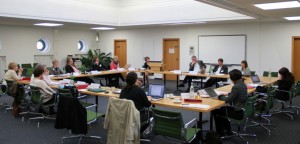WORKSHOP ON JEWISH EDUCATIONAL MEDIA AND CULTURAL TRANSLATION, MAY 2015
 On 5 and 6 May 2015, a workshop which formed part of the DFG research project Innovation through Tradition? brought together scholars from a range of fields (history, educational history, culture research, cultural studies, Jewish studies) to engage in discussion on the concept of ‘cultural translation’ as applied to the analysis of eighteenth- and nineteenth-century Jewish educational media. The project regards these media as sources enabling researchers to obtain greater understanding of the complex history of cultural transformation and cultural transmission and of these processes themselves.
On 5 and 6 May 2015, a workshop which formed part of the DFG research project Innovation through Tradition? brought together scholars from a range of fields (history, educational history, culture research, cultural studies, Jewish studies) to engage in discussion on the concept of ‘cultural translation’ as applied to the analysis of eighteenth- and nineteenth-century Jewish educational media. The project regards these media as sources enabling researchers to obtain greater understanding of the complex history of cultural transformation and cultural transmission and of these processes themselves.
The concept of ‘cultural translation’ opens up an approach to the analysis of educational media which proceeds from the fundamental principle that they do not transmit meaning or interpretations in a linear fashion or merely receive and reproduce them, but rather represent products of complex processes of negotiation and mediation. This perspective highlights the ways in which these sources reflect and translate corpora of knowledge, social norms and values, and patterns of perception and interpretation.
The presentations held during the workshop were on subjects ranging from maskilic (Jewish proponents of the Enlightenment) Trojan-horse strategies to processes of cultural translation from the Schildbürgerbuch to Yiddish Chelm tales, and from textbooks for teaching Hebrew, principles of textbooks for religious education, Jewish sermons and liturgical music in nineteenth-century Germany to Yiddish textbooks in Poland. The diverse disciplinary and transdisciplinary backgrounds of the participants gave rise to unexpected questions and inspiring discussions around the concept of ‘cultural translation’.
[Program / Workshop Booklet / Images]